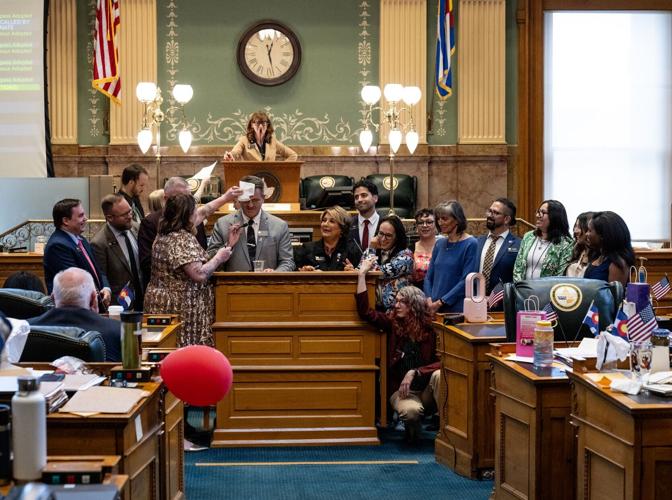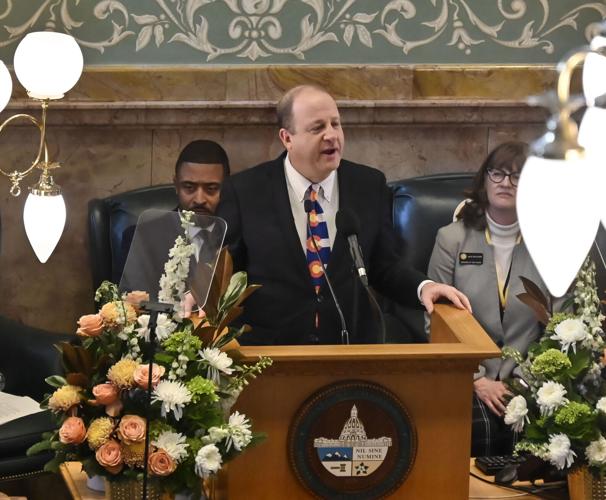Insurance, AI and budget: Here’s how Colorado lawmakers are gearing up for Thursday’s special session

Parker Seibold, The Gazette
Colorado legislators have begun proposing bills for Thursday’s special session, when they will need to figure out how to plug a nearly $800 million budget shortfall.
Only a handful of the measures introduced so far directly deal with the deficit.
Some Democrats — their party holds the majority of the Colorado General Assembly — have pointed to President Donald Trump’s federal budget as the culprit for the state’s budget deficit. They have in, particular, noted Medicaid reductions and changes to the federal tax code.
Republicans, who make up the minority in the General Assembly, have countered that Democrats’ spending is just as much to blame, noting that even before Congress adopted the federal budget, Colorado already faced a $1 billion deficit during the regular 2025 legislative session.
Besides spending reduction measures, state lawmakers are slated to address issues that include taxes, sharp increases in health insurance premiums, and artificial intelligence regulations.
To date, here is a look at the bills currently on the table:

Artificial Intelligence
Artificial intelligence regulations – Introduced by Republican Rep. Ron Weinberg, 25B-0004, aims to address the shortfalls of Senate Bill 205, which Gov. Jared Polis signed, despite concerns by businesses, universities, and other public institutions over the regulations. Polis had asked the legislature to address the problems during the regular session, when efforts failed to produce a fix.
Weinberg’s bill would:
- Change the effective date for the new regulations from early 2026 to Aug. 1, 2027
- Exempt businesses with fewer than 250 employees
- Exempt businesses with less than $5 million in annual revenue
- Exempt local governments with fewer than 100,000 residents
Consumers and AI interactions – SB25-0013 requires the use of artificial intelligence systems to comply with the “Colorado Consumer Protection Act.” This would allow the Attorney General to bring a claim against a developer or deployer that uses an AI system that violates consumer protection laws. This requires consumers to be notified any time they are using artificial intelligence. Reps. William Lindstedt, Michael Carter, Judy Amabile and Lisa Frizell introduced the measure.
Tech neutrality – Introduced by Sen. Mark Baisey, 25B-0012 would repeal the 2024 Senate Bill 205, the original measure that outlined new regulations on artificial intelligence. Colorado laws already apply to the discriminatory aspects of SB 205, the proposal says.
Algorithmic systems – Democratic Sen. Robert Rodriguez, the original sponsor of the 2024 artificial intelligence bill, has introduced 25B-0017 for the special session. The bill primarily reiterates what was passed in the 2024 SB 205 bill with a few changes.

Health care and insurance
Health savings accounts – 25B-0032, introduced by Republican Sen. John Carson, creates an income tax credit for an individual’s contributions to a health saving account that supports high deductible health plans. The credit would be equal to 25% of the amount of the contribution, limited to:
- $500 for a single filer
- $1,000 for joint filers
Subsidies – 25B-0042 addresses the “concerning narrowing eligibility for subsidies allocated by the Health Insurance Affordability Enterprise.” The enterprise is required to allocate a portion of its revenue for subsidies to state-subsidized individual health coverage plans purchased by qualified individuals.
The bill narrows the current definition of “qualified individual” by excluding people who are not in the U.S. legally and individuals who are ineligible for federal health benefits.
Introduced by Republicans Rep. Chris Richardson and Sen. Mark Baisley, the bill states, “In times of fiscal crisis, it is necessary and prudent to prioritize the needs of Colorado citizens and lawfully present residents first, ensuring that scarce state resources are directed to those who are eligible for federal cost sharing or otherwise entitled to benefits under state and federal law. “
Board appointments – 25B-0023 adds additional criteria regarding who the governor can appoint to the Health Insurance Affordability Board.
Introduced by Republicans, Rep. Larry Don Suckla and Sen. Rod Pelton, the bill stresses that rural representation on the state health insurance board is “essential.”
Scope of practice and preventative Care – 25B-0037 proposes authorizing certain healthcare providers to provide specific, low-level preventative healthcare services that are within the scope of practice and training. Democratic Rep. Noquetta Ricks introduced the bill.
Abortion and health services – 25B-0018 aims to require the Colorado Department of Public Health and Environment and the Department of Health Care Policy and Financing to jointly issue advisory guidance to health care providers and facilities prohibited from receiving federal Medicaid financing under the federal budget. The bill would require the two state agencies to provide advice on how to prioritize the continuity of care for “disproportionately impacted communities,” emphasizing “rural areas, communities of color, and low-income populations.” The bill is sponsored by Democratic Reps. Regina English and Junie Joseph, and Sen. Tony Exum.
Prescriptions – 25B-0011 seeks to prohibit a pharmacy benefit manager or a health-care consultant from knowingly making or disseminating false or misleading statements or claims to an employer, health benefit plan sponsor, or policyholder. Democrat Rep. Kenneth DeGraaf introduced the bill.
Tax credits – 25B-0005 authorizes the Department of Treasury to issue insurance premium tax credits to insurance companies that are authorized to do business in Colorado and incur premium tax liability, subject to procedures established by the department. Democratic Reps. Rebekah Stewart and Sean Camacho, and Sens. Janice Marchman and Marc Snyder introduced the measure.
Insurance premium tax rate – 25B-0006 repeals, beginning in 2026, the insurance premium tax rate tax expenditure for home offices or regional home offices. The bill says it is aimed at insurance companies that “continue to qualify for the rate reduction despite not maintaining or increasing their overall employment in Colorado.” Democratic Reps. Javier Mabrey, Andrew Boesenecker, and Sens. Mike Weissman and Julie Gonzales introduced the measure.
Health insurance fund – 25B-0033, introduced by Democratic Rep. Carlos Barron and Republican Scott Bright, requires the health insurance affordability board to reevaluate the allocation of money deposited in the health insurance affordability cash fund on and after July 1, 2026, to:
- Prioritize the facilitation of reducing the health coverage plan premium increases and avoiding the loss of health coverage plans for individuals in the individual market and individuals who are unable to purchase health coverage plans through the exchange.
- Evaluate the costs of the state-subsidized individual health coverage plans purchased by qualified individuals and prioritize the reduction of the health coverage plan premiums for documented residents.

Budget and taxes
Wolf funding – 25B-010 reduces appropriations to the wolf reintroduction program by $264,268 in the current fiscal year. It requires the state treasurer’s office to transfer a corresponding amount from the general fund on Sept. 1.
The bill was introduced by Democratic Reps. Meghan Lukens and Matthew Martinez and Sen. Dylan Roberts. Republican Sen. Marc Caitlin is also listed as a sponsor.
Budget cuts authority – According to current state law, the governor is permitted to suspend or discontinue the functions or services of the state government, including discretionary spending reductions, when there are not sufficient revenues available to carry on the functions of the state governor.
25B-0003, as introduced, requires the governor to promptly notify the Joint Budget Committee of his executive order outlining any such cuts. As soon as is practicable after receiving the notification, the JBC will then meet to discuss the governor’s plan, allowing members to provide advice.
The bill is sponsored by Sens. James Coleman and Judy Amabile. In the House, the bill is sponsored by Democratic Speaker Julie McCluskie and Rep. Emily Sirota.
Spending reduction procedures – 25B-0034, introduced by Joint Budget Committee members Rep. Rick Taggart and Sen. Barbara Kirkmeyer, takes aim at the governor’s spending powers. The two Republicans seek to change procedures for the governor to reduce spending when there is a reduction in revenue, and require the governor to cut spending on interim revenue estimates and to notify and consult with the JBC when implementing plans.
Cash funds – 25B-0025 repeals the authority granted to the governor through House Bill 1321 to expend money in the “Infrastructure and Jobs Act,” which allows Gov. Jared Polis to allocate state funds in defending against what sponsors deemed to be adverse federal action. The special session bill repeals authority to do the following activities:
- Accepting gifts, grants, and donations
- Hiring and employing personnel or retaining contractors for purposes related to federal government actions that impact federal disbursements, grants, contracts, or money received by or transferred to the state
- Reimbursing the Department of Law for costs associated with special assistant attorneys general contracted with
- Providing legal services to state officers or employees related to legal actions initiated, pursued, or threatened by the federal government
- Providing legal services for the criminal defense of state officers or employees in legal actions arising out of official acts or decisions
- Making other expenditures to support the state in defending against “adverse” federal action, as determined by the governor
Vendor fees and sales taxes, the GOP version – Under current state law, a retailer is required to periodically remit to the Department of Revenue the sales tax revenue that it collects and allows some retailers to retain a sales tax vendor fee to cover expenses incurred. 25B-0043, introduced by Republicans Rep. Dan Woog, Rep. Anthony Hartsook and Sen. Barbara Kirkmeyer, increases the maximum a retailer could retain from $1,000 to $2,000 starting on Jan. 1, 2026.
According to the bill, small retailers are struggling to keep up with regulatory changes, and adding this would provide some relief.
Vendor fees and sales taxes, the Democrat version – 25B-0007 is the Democratic version of the vendor fee issue. Introduced by Reps. Steven Woodrow and Karen McCormick and Sens. Faith Winter and Cathy Kipp, the measure eliminates vendor fees by January 2026.
Voter approval and vendor fees – 25B-0024, introduced by Republican Reps. Robert Gonzelez and Max Brooks and Sens. Rod Pelton and Larry Liston, puts the question of reducing vendor fees to retailers to voters in 2026, pushing it as a constitutional amendment.
Federal income tax definition – Current law requires taxpayers to add the amount of any overtime compensation excluded or deducted from the taxpayer’s federal gross income to the federal taxable income for purposes of determining state taxable income. 25B-0028 repeals this provision, adding that, moving forward, this addition requires voter approval. Republicans Reps. Rose Pugliese, Jarvis Caldwell, and Sens. Byron Pelton and Barbara Kirkmeyer introduced the measure.
Corporate income tax foreign jurisdictions – Current law lists certain foreign jurisdictions in which a C corporation is presumptively incorporated to avoid state corporate income tax and allows a C corporation to rebut that presumption by proving, to the satisfaction of the executive director of the Department of Revenue, that it is incorporated in the listed foreign jurisdiction for reasons that meet the economic substance doctrine described in the federal internal revenue code. 25B-0008 permits the executive director to determine, without proof from the C corporation, whether the corporation is incorporated in a foreign jurisdiction. The bill was introduced by Democratic Reps. Yara Zokaie and Bob Marshall and Sen. Matt Ball.
Qualified bus income deduction – Introduced by Democratic Reps. Emily Sirota and Sens. Nick Hinrichsen and Lisa Cutter, 25B-009 continues indefinitely the existing requirements that an amount equal to the federal qualified business income deduction allowed under section 199A of the federal “Internal Revenue Code of 1986” must be added by certain taxpayers to their federal taxable income to determine state taxable income.
State-only funding for certain entities – 25B-0001 requires that any the Department of Health Care Policy and Financing use only state funds to reimburse entities that provide covered services and which are prohibited from receiving reimbursement from the federal centers for Medicare and Medicaid services. The bill would be retroactive to July 1. The Democratic bill was sponsored by Reps. Jeff Bridges and Lindsey Daugherty and Sens. Jenny Willford and Jennifer Bacon.
School meals – Aiming to fill a $50 million gap that Democrats claimed is caused by the Republican-led federal budget approval, 25B-0002 changes a question going to voters to add millions more to the funding program that provides Colorado students with free meals.
Sponsored by Reps. Dafna Michaelson Jenet and Katie Wallace and Sens. Lorena Garcia and Katie Stewart, the bill amends the ballot measure slated to go before voters next year, in which the state is asking voters to approve another $95 million to fund the program. The ballot measure is meant to increase funding for the free school meals program, which costs millions more than originally estimated.












